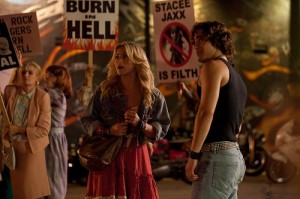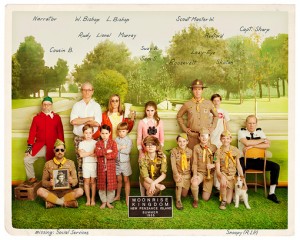Rock of Ages
Posted on June 14, 2012 at 6:00 pm
 The era of big power ballads reaching to the back rows of big stadiums filled with big crowds of fans with big hair is paid big tribute in this irresistibly entertaining anthem-rock love letter to the 80’s. Sung almost entirely by actors rather than rockers, the music is homogenized, somewhere between a “Glee” episode and a real glee club performance. But, let’s face it. Some of these songs were close to parody even at the time.
The era of big power ballads reaching to the back rows of big stadiums filled with big crowds of fans with big hair is paid big tribute in this irresistibly entertaining anthem-rock love letter to the 80’s. Sung almost entirely by actors rather than rockers, the music is homogenized, somewhere between a “Glee” episode and a real glee club performance. But, let’s face it. Some of these songs were close to parody even at the time.
Marx famously said that history repeats itself, first as tragedy and then as farce. When it comes to music, history repeats itself, too. First — at least ideally — it is raw and authentic expression of emotion and, as “School of Rock” reminds us, “sticking it to The Man.” When it repeats itself, it is The Man. Yes, “Rock of Ages” is a jukebox musical that turns the barbaric yawps and screeches of rock and roll into something between karaoke, elevator music, and Up with People. Journey’s “Anyway You Want It” is currently being used as an insurance company jingle and background music in an animated kids’ film, Madagascar 3 and Dee Snider sings in an ad about cleaning the rock and roll out of your carpet. So it’s hard to say that it dilutes the authenticity of these songs to be performed by Mary J. Blige, Constantine Maroulis, and Julianne Hough.
Various romantic, business, and existential conflicts provide excuses for songs from Bon Jovi, Guns N Roses, Def Leppard, Twisted Sister, Poison, and Pat Benetar. Hough plays Sherrie (how did they not include “Oh, Sherrie?”), a small-town girl, living in a lonely world, who takes not the midnight train to anywhere but the midnight bus from Oklahoma to Los Angeles, in search of the excitement and adventure she has glimpsed through her beloved collection of record albums. They — along with everything else she owns — are stolen as soon as she arrives. But Drew (Diego Boneta), a city boy who works at a club and wants to be a singer, gets her a job as a waitress. The club is owned by Dennis (Alec Baldwin), who is hoping that an upcoming show from a superstar rock group he helped in their early days will solve his financial problems. His devoted techie (that’s sound technology, not computers, back in the 80’s) is Lonny (Russell Brand).
The group is the fictitious Arsenal and this is their last show. Their rock god frontman, Stacee Jaxx (Tom Cruise) is leaving them for a solo career. Also arriving is the Rolling Stone reporter who is, uh covering Jaxx (Malin Ackerman). And also on her way is the wife of the mayor (Catherine Zeta Jones), leading the charge against rock and roll for its outrageous lyrics and sexual rhythms, in support of her husband’s plan to drive out sex, drugs, and rock and roll so he can let his business cronies gentrify the area. The irony is not lost that the storyline in the movie gentrifies not only the music it portrays but the plot of the already-prettied-up musical playing since 2009 near the already-gentrified Times Square. The script has a few choice moments, including a funny joke about another element of 80’s music — boy bands. And it is cute to have the protesting women sing a real rock anthem, “We’re Not Going to Take It” while the rock fans sing the song even the Jefferson Starship (nee Airplane) is embarrassed by, “We Built This City.” (Look carefully in the crowd for some real 80’s stars including Debbie Gibson and Sebastian Bach.)
If the songs are a little soft in the middle, well so are the teenagers of the 80’s who are this film’s target audience. Hough and Boneta are so bland they all but disappear fromt the screen. The only real singer in the cast is Mary J. Blige, but Cruise vamps like a superstar and his performance is choice. As the rock star who is as zonked by ennui as he is by substance abuse and groupies but who comes alive on stage imploring us to pour some sugar on him, he is a hoot. He is clearly having the time of his life and the pure enjoyment he, Baldwin, Brand, and Zeta Jones bring to the film is as buoyant as the still-hummable music. Yes, we were young, heartache to heartache we stood, and like the brick-sized cell phones, buying albums at Tower Records, and cassette tapes, the memories bring a smile. And some devil’s horns.
Parents should know that this film includes gay and straight sexual situations and explicit situations including groupies and strippers, drinking and drunkenness, and some strong language.
Family discussion: What has changed the most in popular music since these songs were hits? Which of today’s songs will still be popular 30 years from now?
If you like this, try: “Across the Universe” and concert films from some of the groups whose songs are featured in this movie like Def Leppard’s “Rock of Ages,” Bon Jovi’s “Life at Madison Square Garden,” and Guns ‘n’ Roses’ “Use Your Illusions” I and II
For a weekly newsletter with my latest reviews, sign up here!





